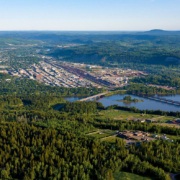Tax on Airbnb Income in Burlington, Ontario: A Comprehensive Overview
Introduction: Navigating Tax on Airbnb Income in Burlington
The growing popularity of Airbnb as a source of supplementary income has led to a surge in short-term rental properties across the globe. Burlington, Ontario, is no exception to this trend, with more and more homeowners choosing to rent out their properties to visitors. However, understanding the tax implications of earning income from Airbnb rentals is crucial for property owners in Burlington. This comprehensive overview will provide valuable information on how to navigate the tax on Airbnb income in Burlington, Ontario, ensuring that you stay compliant with the tax regulations and optimize your profits.
Airbnb Management Service in Burlington
Federal Tax Implications for Airbnb Hosts
The Canada Revenue Agency (CRA) needs to know about any money you make from renting out your home on Airbnb because it is taxable income. If you are a Canadian resident, you will need to report your Airbnb income as rental income on your personal income tax return.
Based on the most current data for 2024, Canada’s tax system employs a tiered approach where tax rates escalate according to income levels:
- 15% applies to taxable income up to $55,867,
- 20.5% is charged on income exceeding $55,867 but not surpassing $111,733,
- 26% is levied on income above $111,733 and up to $173,205,
- 29% on income that is more than $173,205 but does not exceed $246,752,
- 33% on any income beyond $246,752.
For those hosting through Airbnb, this implies that rental earnings supplement other income streams, potentially elevating them into a steeper tax bracket. For instance, should an Airbnb host’s additional income situate them within the third bracket, their rental earnings would incur a 26% tax. And, should their aggregate income propel them into a subsequent bracket, a portion of their earnings would be subject to an increased tax of 29% or possibly 33%, contingent upon the overall sum.
Grasping these tiers is vital for Airbnb hosts as it shapes their tax planning strategies, from setting aside funds for tax payments and maximizing deductible expenses, to organizing their fiscal year. Canada’s tiered tax model is designed to proportion tax liability according to financial ability, where those with higher earnings pay a greater fraction of their income in tax.
It’s advisable for Airbnb hosts to keep these tax rates in mind while preparing their tax returns and to seek advice from a tax expert of MasterHost to leverage all possible deductions and credits to lower their taxable earnings. Such measures not only aid in adhering to tax laws but also in enhancing the profitability of their property rental ventures.
Provincial Tax Implications in Ontario
In Ontario, property owners also have to think about provincial taxes on top of federal taxes. The provincial tax rate varies depending on your personal income level and is applied on top of the federal tax rate. Make sure to look up the current tax rates and brackets in Ontario so you can figure out how much you owe in taxes.
Reflecting on the revised income tax rates for Ontario in 2024, the discussion on provincial tax rates and brackets undergoes an update, as outlined below:
In the tax year 2024, the structure of Ontario’s income tax continues to progress through a series of rates corresponding to defined income levels. This progressive structure aims to distribute the tax burden fairly, ensuring that those with higher incomes contribute a larger share of their earnings towards taxes. The tax rates and thresholds for 2024 are as follows:
- 5.05% for taxable income up to $51,446,
- 9.15% for income exceeding $51,446 and up to $102,894,
- 11.16% for income beyond $102,894 and up to $150,000,
- 12.16% for income over $150,000 and up to $220,000,
- 13.16% for income above $220,000.
These rates are applicable to the earnings of individuals residing in Ontario, inclusive of income derived from Airbnb rentals. Airbnb hosts need to be aware that their earnings from rentals, when combined with other sources of income, might elevate them to a higher tax bracket.
For instance, should the aggregate income of an Airbnb host range from $51,446 to $102,894, the income over $51,446 is taxed at 9.15%. Should their total earnings advance into a subsequent bracket, the relevant portion of their income would be subject to a higher tax rate, with a maximum of 13.16% for earnings above $220,000.
Airbnb hosts in Ontario are encouraged to engage actively in tax planning. This involves precise reporting of rental income, meticulous recording and claiming of permissible expenses to lower taxable income, and an understanding of the impact of both federal and provincial tax duties on their overall tax burden.
Acknowledging and adjusting to these updated tax rates and brackets is essential for financial strategy and adherence to tax regulations. Engaging a tax professional for guidance through the tax landscape can assist hosts in maximizing deductions and credits, thereby efficiently managing their tax responsibilities.
Municipal Accommodation Tax (MAT) in Burlington

The City of Burlington started the Municipal Accommodation Tax (MAT) in 2020. It applies to all short-term accommodations that are rented for less than 30 days in a row. The MAT rate is currently set at 4% of the total rent charged for a short-term rental. As an Airbnb host, it is your responsibility to collect the MAT from your guests and remit it to the city. Read more here.
HST: Harmonized Sales Tax on Airbnb Income
Airbnb hosts in Burlington are also subject to the Harmonized Sales Tax (HST). This tax combines the federal Goods and Services Tax (GST) and the provincial sales tax (PST). The HST rate in Ontario is 13% and applies to the total amount collected from your guests, including the rental fee, cleaning fees, and other service charges. If you earn more than $30,000 in gross revenue from your Airbnb rental within a 12-month period, you will need to register for an HST account and collect HST on your rental income.
Tax Deductions and Expenses for Airbnb Hosts
To optimize your tax situation, it’s essential to understand which expenses can be claimed as tax deductions. Airbnb hosts can usually deduct things like mortgage interest, property taxes, insurance, utilities, repairs, maintenance, and advertising costs. Keep detailed records of these expenses to ensure you can substantiate your claims in the event of a CRA audit.
Record-keeping and Tax Compliance
Proper record-keeping is vital for Airbnb hosts to ensure tax compliance. Keep track of all your rental income, expenses, and HST collected. Putting this information in order will not only make filing your taxes easier, but it will also help you find ways to get the most deductions possible.
For record-keeping, it’s beneficial to mention the importance of retaining documents for at least six years from the end of the last tax year they relate to, as required by the CRA. This includes digital records of bookings, receipts for expenses, bank statements, and communication with guests that can justify the duration and income from rentals.
Reporting Your Airbnb Income: Filing Your Taxes

When it’s time to file your taxes, report your Airbnb income on Form T776, Statement of Real Estate Rentals. Include all your rental income and expenses on this form, which will then be used to calculate your net rental income or loss. This amount will be reported on your personal income tax return (T1) and will be subject to federal and provincial taxes.
Seeking Professional Help: Tax Experts and Accountants
Navigating the complexities of taxing Airbnb income in Burlington can be challenging, especially if you’re new to the world of short-term rentals. Consider getting help from a tax expert or accountant to make sure you’re following all tax rules and getting the most out of your deductions. A professional can help you understand the nuances of the tax code, guide you through the process, and ensure you take advantage of all available tax benefits.
Penalties for Non-Compliance: Understanding the Risks
If you don’t report your Airbnb income or pay the taxes you need to, you could face big fines and interest charges. The Canada Revenue Agency (CRA) specifies a range of penalties and interest for non-compliance with tax regulations, including delays in filing returns or incorrect income declarations. It applies a distinct penalty scheme, charging 5% of the due tax as an initial penalty, with an additional 1% of the owed tax for each month the return is overdue, up to a maximum of 12 months. This information is detailed in the CRA’s penalty guidelines for individual taxpayers.
Staying Informed: Changes in Tax Regulations

Tax regulations and rates are subject to change. It’s essential for Airbnb hosts in Burlington to stay informed about any updates to federal, provincial, and municipal tax laws that may impact their rental income. Check the CRA website often and talk to tax experts to make sure you know the most up-to-date tax rules and regulations.
You can also read Why Airbnb in Markham is a Great Investment Opportunity.
Conclusion: A Proactive Approach to Taxing Airbnb Income in Burlington
Property owners in Burlington, Ontario, need to know what the tax implications of making money from Airbnb rentals are. Taking a proactive approach to tax compliance and planning can help you make the most money, pay the least amount of tax, and avoid fines. Stay up-to-date on tax laws, keep accurate records, and get professional help when you need it to make sure your Airbnb business is successful and legal.
Check out What You Need to Know About Vaughan, ON, Airbnb Income Taxes.












